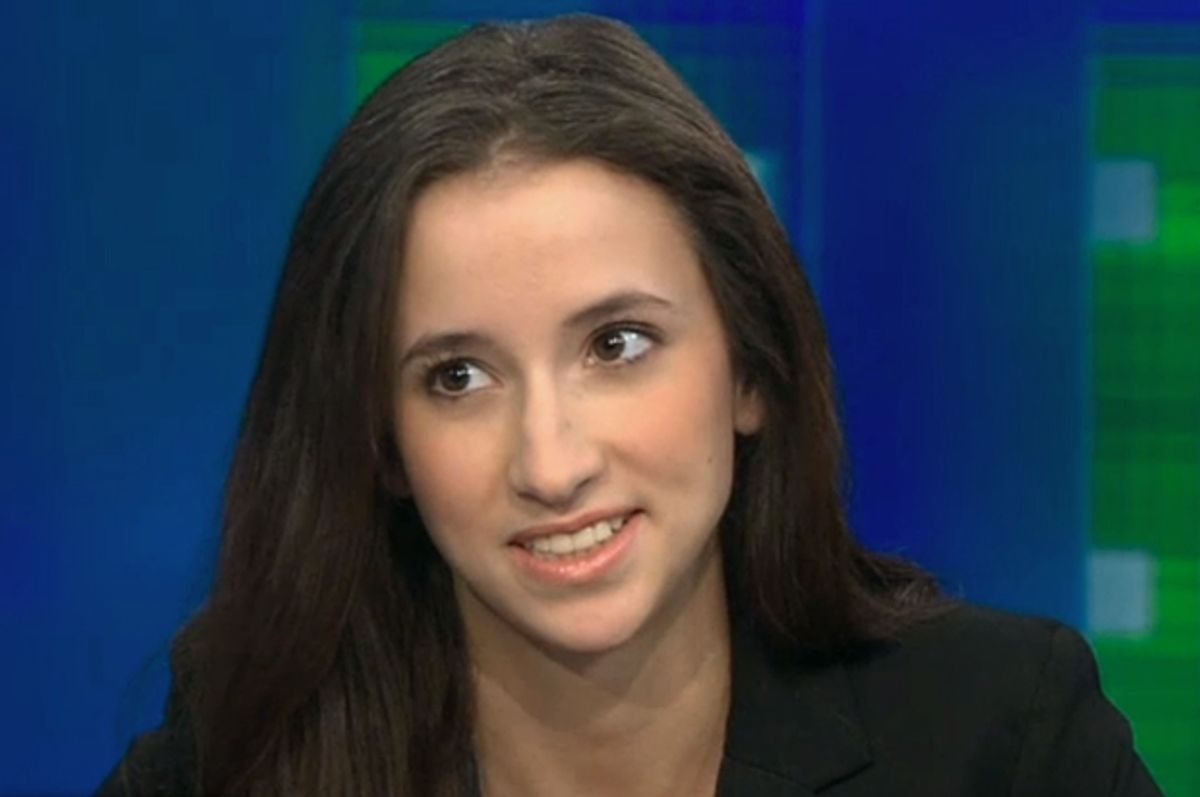An ironic and unfortunate twist has developed in the life of Miriam Weeks, the Duke University student better known as porn star Belle Knox: Due to her illustrious porn career, which Weeks undertook to pay her tuition at Duke, she will no longer qualify for financial aid. It seems like her porn work can cover the full tuition, so she'll stay at Duke -- but in response, Weeks has criticized the college-crazy culture that tells "every kid to go to college, regardless of their future plans or ability to graduate" and the absurd tuition hikes that we have become accustomed to.
Weeks writes in Time:
This year, even after student aid, I faced a $47,000 bill to attend Duke University. My turn to porn to close the gap was so famous, in part, due to my reasoning. Faced with either a degree from a less prestigious school or decades of crushing debt, a few hours of work on a porn set revealed itself to be the best way to avoid getting screwed.
To make matters worse, my income now makes me ineligible for the $13,000 in aid I was receiving. My bill for next year will be a staggering $62,000. And I will pay this all on my own; the financial aid office does not care that I am legally financially independent. They view it as my parent’s responsibility to foot the bill.
Weeks, who admitted to having "considered dropping out of Duke," analyzed where her money will be going:
Officials at my school responded that $60,000 is a bargain — they actually spend $90,000 a year on each student. Let’s break that $90,000 down. Building and maintaining physical infrastructure on campus gets $8,000. Another $14,000 goes to pay a share of administrative and academic support salaries, which in Duke’s case includes more than $1 million in total compensation to the university president, Richard Brodhead, and more than $500,000 to the provost, Peter Lange, according to 2011 tax filings. Also, $14,000 goes to dorms, food, and health services; $7,000 goes to staff salaries for deans and faculty; and miscellaneous costs take up another $5,000.
And on March 1st, the trustees of Duke raised tuition from $44,020 this year to $45,800 for the 2014-2015 academic year.
I have considered dropping out of Duke. I have sacrificed more than my squeaky clean reputation to finance my education. Flying to shoots during breaks means I rarely see my family. And, of course, my choice to finance through porn has meant intense ridicule and harassment.
The problem is a common one for students of the middle class, Weeks says:
I’m hardly the only student who’s struggling with these sky-high bills. Experts predict a massive student loan default on the horizon, on par with the last major mortgage crisis. And, like the mortgage crisis, it’s likely the banks and lenders will be bailed out, while the students will be saddled with wage garnishments and ruined credit.
Government must stop the flow of money to schools in order to get tuition rates under control again. That means being honest about the fact that not every child should go to college. Only 59% of full-time, first-time undergraduate students who began their pursuit of a bachelor’s degree at a 4-year degree-granting institution graduate in four years. That also means making students who can’t afford tuition out of pocket find funding in the private market, where lenders are too judicious to lend someone $150,000 to get a BA in underwater basketweaving.
But the solution Weeks serves up next, via Sheldon Richman, vice president of the Future of Freedom Foundation and "Separating School: Liberating America’s Families" author, seems to overreach the thesis of the essay. Weeks agrees with Richman, who writes:
The solution is a complete separation of school and state at all levels. Competition drives down prices and improves products and services, as entrepreneurs strive to win customers by offering a better deal in terms of quality and cost. Government cannot help because the law of unintended consequences cannot be repealed.
Based on Weeks' interpretation, would this not also eliminate financial aid for students? And, if that were to happen, would colleges drop their prices to make it more affordable (and would that be enough)? Weeks crafts a careful, smart argument, but her hasty conclusion shows how complex finding the solution is. Meanwhile, college tuition remains, as she writes, "sky-high."

Shares